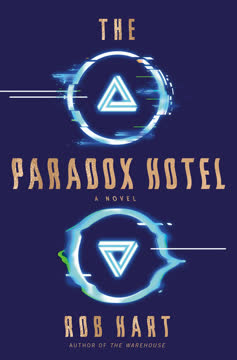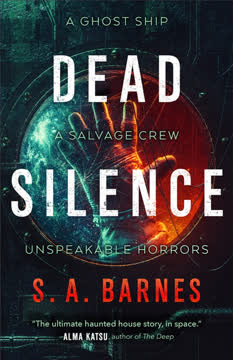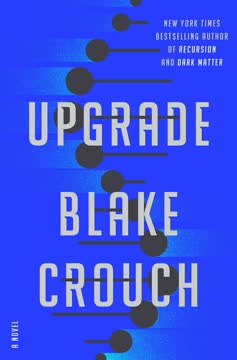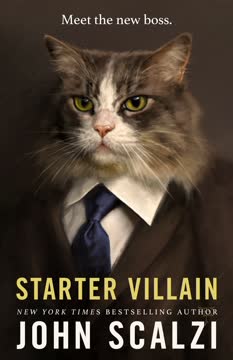Plot Summary
Blue Carpet, Broken Time
January Cole, head of security at the Paradox Hotel, is Unstuck—her mind slips through time, haunted by memories and visions. The hotel, built beside a government timeport, is a place where the past, present, and future bleed together. January's condition is worsening, and her only lifeline is Retronim, a drug that delays the inevitable collapse of her mind. As she navigates the blue-carpeted halls, she's drawn into a web of anomalies: clocks stutter, guests see ghosts, and reality itself seems to fracture. The hotel is full of secrets, and January is both its guardian and its most vulnerable resident, clinging to the fragments of her identity as time itself begins to break.
Unstuck in the Lobby
January's daily life is a battle against her own mind. She's haunted by the memory of her lost love, Mena, and the knowledge that her Unstuck condition is terminal. The Paradox Hotel is a liminal space, filled with travelers waiting to visit the past, and January's job is to keep order amid chaos. She's surrounded by a cast of staff and guests, each with their own agendas. As the government prepares to auction off the hotel and timeport to the highest bidder, January's grip on reality slips further. She sees things others can't—ghosts, future deaths, and impossible events—making her both a liability and the only one who can sense the coming disaster.
Dinosaurs and Dead Men
The hotel is thrown into turmoil when three baby dinosaurs escape into the halls, the result of a smuggling operation gone awry. January and her new partner, Nik, scramble to contain the creatures, but the incident is only the beginning. Amid the chaos, January discovers a corpse in a guest room—a man she saw alive only hours before. The body is frozen in time, visible only to her, and the rules of causality seem to have broken down. As she investigates, she realizes that someone is tampering with the hotel's security systems, erasing video footage and hiding evidence. The boundaries between past, present, and future are dissolving, and January is at the center of the storm.
Ghosts in the Hallways
The Paradox Hotel is alive with ghosts—some are echoes of the past, others are warnings of the future. January is haunted by visions of Mena, her dead lover, whose presence is both a comfort and a torment. The staff and guests report strange sightings: a little girl wandering the halls, conversations in empty rooms, and figures that vanish when approached. January's investigation into the dead man leads her to suspect that the hotel itself is a container for lost moments, a place where unresolved pain lingers. Her own grief and guilt threaten to overwhelm her, and she lashes out at those around her, pushing away the very people who care for her most.
The Summit's Shadow
The government's decision to privatize the timeport draws four trillionaires to the hotel, each with their own vision for the future of time travel. January is tasked with maintaining security during the high-stakes summit, but tensions run high. The bidders—Teller, Smith, Davis, and the Saudi prince—are ruthless, and their entourages bring intrigue and danger. Senator Drucker, overseeing the process, is more interested in political gain than safety. As the summit approaches, sabotage and violence escalate. January's suspicions grow: someone is willing to kill to control the timestream, and the hotel's reality is unraveling faster than anyone realizes.
The Clock Stutters
The hotel's atomic clock, the heart of its lobby, begins to stutter and jump, its hands moving erratically. Flights are grounded, and the timeport is shut down. Staff and guests experience slips in time—sunsets arrive early, ovens cook food in minutes, and objects appear and disappear. January's own slips become more severe, blurring the line between memory and hallucination. She discovers that the hotel's security system is being hacked, video feeds are missing, and someone is erasing evidence of crimes. The staff, already stretched thin, struggle to maintain order as the fabric of reality frays.
Poisoned Presents
The chaos intensifies when Kolten Smith, one of the bidders, is nearly killed by a poisoned sandwich and a missing EpiPen. January's investigation reveals that someone is manipulating events to eliminate rivals and sow confusion. The attacks are subtle, designed to look like accidents or the result of time anomalies. January suspects that the true target is not just the bidders, but the timestream itself. As she pieces together the clues, she realizes that the hotel's ghosts are not just memories—they are the echoes of choices, regrets, and betrayals that refuse to die.
The Secret Room
January uncovers evidence of a secret room in the hotel, a place that exists outside the timestream. Built by the hotel's architect, Fairbanks, and the inventor of time travel, Simms, the room was a sanctuary for their forbidden love—a place where time stands still. The gateway is powered by advanced time-cloaking technology, capable of hiding not just data, but people and events. January realizes that the room is the source of the hotel's anomalies, and that someone is using it to manipulate reality. The ghosts in the hotel are travelers lost between moments, and the secret room is both a refuge and a weapon.
The Gateway's Price
As January explores the gateway, she is nearly killed by the pressure of existing outside time. The experience leaves her shaken and bleeding, her mind on the verge of collapse. She learns that the gateway has been used to hide crimes, erase evidence, and alter the course of events. The hotel's manager, Reg, is revealed to be complicit in the conspiracy, faking financial losses to justify the sale. The true mastermind is Osgood Davis, who has used the gateway and the government's time-black-box—the Jabberwocky—to rewrite history and enrich himself. The price of their ambition is the unraveling of reality itself.
The Past Bleeds Through
The boundaries between past and present dissolve as time anomalies spread beyond the hotel. Guests and staff witness historical events—battles, mammoths, and ghosts—playing out in real time. January's own past comes to the surface: her childhood loneliness, her parents' indifference, and her guilt over Mena's death. She is forced to confront the truth that she accidentally caused the gas leak that killed Mena, and that her anger and grief have poisoned her relationships. Forgiveness and acceptance become the only path forward, as she seeks to heal herself and those she has hurt.
Family of Strangers
As the hotel descends into panic, January realizes that the staff and guests are her chosen family—her sangha. She apologizes to those she has wronged, seeking redemption and connection. The staff rally together, evacuating the hotel and protecting each other from the dangers unleashed by the gateway. January's journey becomes one of self-acceptance, as she learns that vulnerability is not weakness, but strength. The love she shared with Mena, and the bonds she forms with her colleagues, become her anchor in the storm. In the end, it is compassion, not control, that offers hope.
The Bodhisattva's Vow
Guided by memories of Mena and the teachings of Buddhism, January embraces the bodhisattva's vow: to delay her own peace in order to save others from suffering. She faces the ultimate test as the mastermind's plan is revealed—Nik, her partner, is a traitor, working with Davis to seize control of the timestream. The final confrontation takes place in the gateway, where time is frozen and every choice matters. January's willingness to sacrifice herself, to face her own pain and forgive those who wronged her, becomes the key to restoring balance. The cycle of suffering is broken not by violence, but by compassion.
Betrayals and Revelations
The truth comes to light: Davis, using the Jabberwocky and the gateway, has rewritten history to enrich himself and secure the sale of the hotel. Nik, manipulated by promises of power, becomes the instrument of destruction. Senator Drucker is revealed as a political opportunist, willing to sell out anyone for her own gain. January, with the help of her friends and the AI Ruby, exposes the conspiracy and confronts the consequences of their actions. The cost of meddling with time is made clear—reality itself is at stake, and only by setting things right can the world be saved.
The Collapse Begins
Time fractures completely as the gateway's power spirals out of control. The hotel becomes a nexus of anomalies—ghosts, dinosaurs, and historical events bleed into the present. January, wounded and dying, races to stop Nik from using the gateway to escape into the timestream. The final battle is both physical and metaphysical, as January confronts her own shadow and the collective pain of those around her. The only way to heal the world is to accept the past, forgive herself, and let go of the need for control. The collapse is both an ending and a beginning.
Facing the Self
In the timeless space of the gateway, January faces her greatest fear: herself. Guided by the ghost of Mena, she relives her childhood wounds, her guilt, and her longing for love. She embraces the little girl she once was, offering forgiveness and compassion. The act of self-acceptance transforms her, allowing her to see the bigger picture—the interconnectedness of all moments, the beauty in each dot of the painting. By letting go of her suffering, she becomes the agent of healing, not just for herself, but for the world. The paradox of time is resolved through love.
The Last Choice
With the gateway destroyed and the conspirators exposed, January makes the ultimate sacrifice. She confronts Nik in the frozen world outside time, choosing compassion over vengeance. Her actions restore the balance of the timestream, closing the gateway and ending the anomalies. January's journey ends not with triumph, but with acceptance—of her own mortality, her flaws, and her capacity for love. The hotel is saved, but at the cost of her own place in time. Her legacy is the family she found and the suffering she ended.
The Lovers' Legacy
In the aftermath, the Paradox Hotel is a quieter place, haunted by the echoes of those who passed through. The staff remember January and Mena as the Lovers, their story a legend that lingers in the halls. The hotel becomes a sanctuary for those seeking comfort, connection, and meaning. The ghosts remain, not as threats, but as reminders of the power of love and the importance of each moment. The paradox of time is not a problem to be solved, but a mystery to be lived. In the end, it is the present—the garden of memory, the palace of dreams—that endures.
Characters
January Cole
January is the head of security at the Paradox Hotel, a former time enforcement agent whose mind is fractured by exposure to the timestream. Her Unstuck condition causes her to slip through time, experiencing past and future moments as vividly as the present. Driven by guilt over the death of her lover, Mena, and her own childhood wounds, January is both abrasive and deeply compassionate. Her journey is one of self-acceptance, as she learns to forgive herself and embrace vulnerability. Her relationships with the staff—her chosen family—anchor her, and her willingness to sacrifice herself for others becomes her redemption. January's arc is a meditation on grief, love, and the paradox of time.
Mena
Mena is January's lover, a former stewardess at the timeport who died in a tragic accident. Her presence haunts January, appearing as a ghost, a memory, and a guide. Mena's wisdom, rooted in Buddhist philosophy, offers January a path to healing—through compassion, acceptance, and the bodhisattva's vow. Mena's own struggles with identity and acceptance mirror January's, and her love is both a source of pain and a beacon of hope. In the timeless space of the gateway, Mena helps January face her deepest wounds, teaching her that love endures beyond time and that forgiveness is the key to ending suffering.
Nik Moreau
Nik is January's new partner, assigned to assist with security during the summit. Outwardly affable and eager to please, Nik is secretly working with Osgood Davis to manipulate the timestream and seize control of the hotel. His motivations are rooted in resentment and a desire for power, making him susceptible to Davis's promises. Nik's betrayal is a catalyst for the hotel's collapse, forcing January to confront the consequences of trust and the dangers of unchecked ambition. His arc is a cautionary tale about the seduction of power and the cost of betrayal.
Osgood Davis
Davis is one of the bidders for the hotel, a tech magnate with a hidden past as the government's digital operations chief. Using the Jabberwocky and the gateway, Davis rewrites history to enrich himself and secure the sale. His charm and apparent wisdom mask a ruthless drive for control, and his actions threaten the fabric of reality. Davis embodies the dangers of unchecked ambition and the ethical dilemmas of time travel. His relationship with Nik is one of manipulation, and his ultimate downfall is a result of his inability to see beyond his own desires.
Senator Danica Drucker
Drucker oversees the sale of the hotel, using the process to advance her own career. She cuts deals with all the bidders, willing to betray anyone for personal gain. Her lack of empathy and moral flexibility make her a formidable antagonist, but also a symbol of the systemic corruption that enables the hotel's collapse. Drucker's arc is a critique of political ambition divorced from responsibility, and her eventual exposure is a victory for accountability.
Reg
Reg is the hotel's manager, a father figure to the staff and a stabilizing presence amid chaos. His involvement in the conspiracy to fake the hotel's financial losses is driven by desperation and a desire for security. Reg's death is a turning point, exposing the human cost of the bidders' ambitions and the vulnerability of those caught in the crossfire. His legacy is one of care and sacrifice, and his loss galvanizes the staff to protect each other.
Cameo
Cameo is the hotel's concierge, a nonbinary pillar of strength and wisdom. They serve as a confidant and advisor to January, offering both tough love and unwavering support. Cameo's understanding of grief, family, and community helps January find her place in the world. Their role as the heart of the hotel is essential to its survival, and their forgiveness is a gift that enables January's redemption.
Brandon
Brandon is the hotel's porter, often underestimated due to his laid-back demeanor and constant high. In reality, he holds a degree in particle physics and provides crucial insight into the hotel's anomalies. Brandon's kindness and resilience make him a key member of the staff's chosen family. His forgiveness of January's mistakes is a testament to the power of compassion and the importance of second chances.
Ruby
Ruby is January's AI drone, programmed to assist with security but developing a personality of its own. Its banter with January provides levity, but its loyalty and resourcefulness are vital to the investigation. Ruby's ability to adapt, learn, and even forgive mirrors the human journey of growth and connection. In the end, Ruby's friendship is a reminder that even artificial beings can become part of a family.
Allyn Danbridge
Allyn is January's former partner and the TEA director overseeing the hotel's security. Haunted by his own regrets and the burden of responsibility, Allyn struggles to balance loyalty to January with the demands of his position. His attempts to protect her are both a strength and a weakness, and his eventual death is a moment of profound loss. Allyn's arc is a meditation on friendship, duty, and the limits of control.
Plot Devices
Time as a Fractured Container
The novel uses the block universe model—eternalism—as both a scientific and narrative device. January's Unstuck condition allows the story to move fluidly between past, present, and future, blurring the boundaries of causality. The hotel itself is a container for moments, memories, and ghosts, embodying the paradox of time as both fixed and fluid. The secret room, or gateway, is a literal and metaphorical space outside time, where choices and consequences are magnified. The narrative structure mirrors January's experience, using slips, flashbacks, and hallucinations to create a sense of disorientation and inevitability.
Foreshadowing and Recursion
The story is rich with foreshadowing—visions of future deaths, repeated motifs (the blue carpet, the clock, the painting), and the constant presence of ghosts. January's slips are both warnings and opportunities, allowing her to change the course of events but also raising questions about free will. The recursive nature of time is embodied in the hotel's hauntings, the repetition of trauma, and the cycle of suffering. The narrative uses these devices to build tension, create mystery, and ultimately resolve the paradox through acceptance and compassion.
The Bodhisattva's Vow and Buddhist Philosophy
The novel weaves Buddhist concepts—sangha, the bodhisattva's vow, the end of suffering—into its plot and character arcs. January's journey is one of self-acceptance, forgiveness, and the willingness to sacrifice for others. The paradox of time is resolved not through control or violence, but through compassion and connection. The painting, A Sunday Afternoon on the Island of La Grande Jatte, serves as a symbol of the beauty in each moment and the importance of seeing the bigger picture. The story's resolution is a meditation on the power of love to heal even the deepest wounds.
Analysis
The Paradox Hotel is a dazzling meditation on time, grief, and the human longing for connection. Rob Hart uses the trappings of a time-travel thriller—a locked-room mystery, a corporate conspiracy, and a collapsing reality—to explore the deeper paradoxes of existence: how we are shaped by our past, haunted by our regrets, and redeemed by our capacity for love. The novel's nonlinear structure, driven by January's Unstuck condition, immerses the reader in the disorienting experience of trauma and healing. The hotel, with its ghosts and secrets, becomes a metaphor for the mind—a place where memories linger, pain festers, and hope endures. The story's ultimate lesson is that the only way to end suffering is to accept it, forgive ourselves and others, and embrace the present moment. In a world obsessed with control and power, The Paradox Hotel offers a radical alternative: compassion, vulnerability, and the courage to love. The book's legacy is not in its clever twists or high-concept science, but in its profound empathy and its celebration of the messy, beautiful paradox of being alive.
Last updated:
Review Summary
The Paradox Hotel receives mixed reviews, with an average rating of 3.53/5. Readers appreciate the unique time travel premise and January Cole's complex character, but some find the plot convoluted and hard to follow. The book explores themes of grief, found family, and wealth inequality. Many praise Hart's writing style and action scenes, while others criticize the abundance of characters and occasional pacing issues. Despite its flaws, most readers find the novel entertaining and thought-provoking, particularly enjoying the blend of sci-fi, mystery, and emotional depth.












